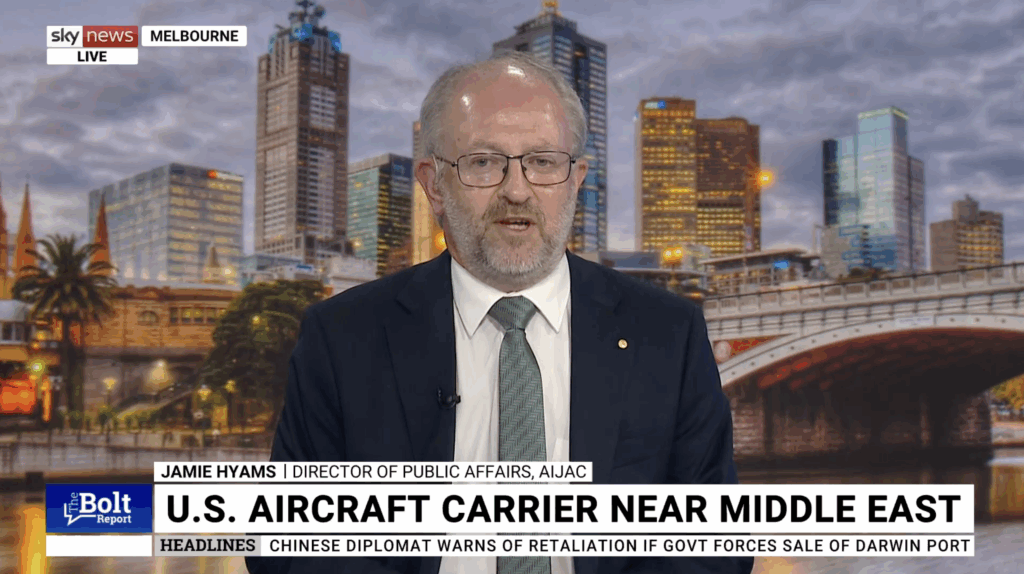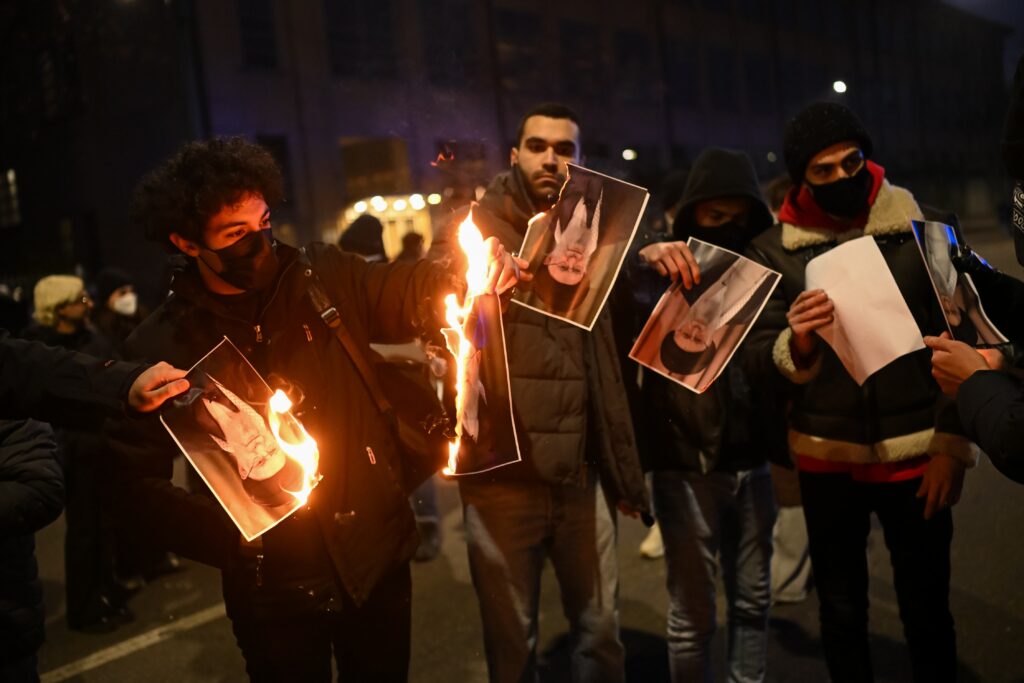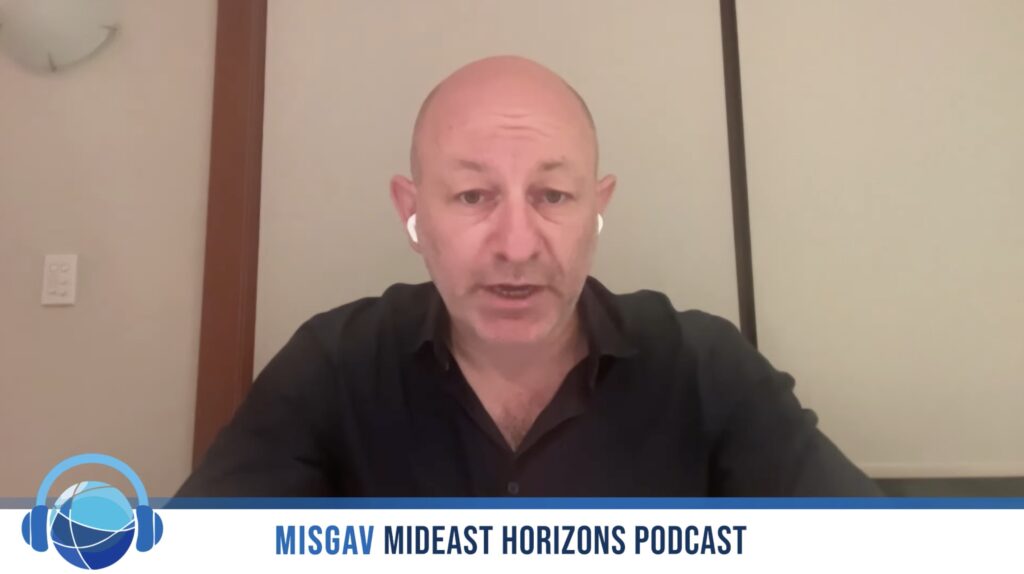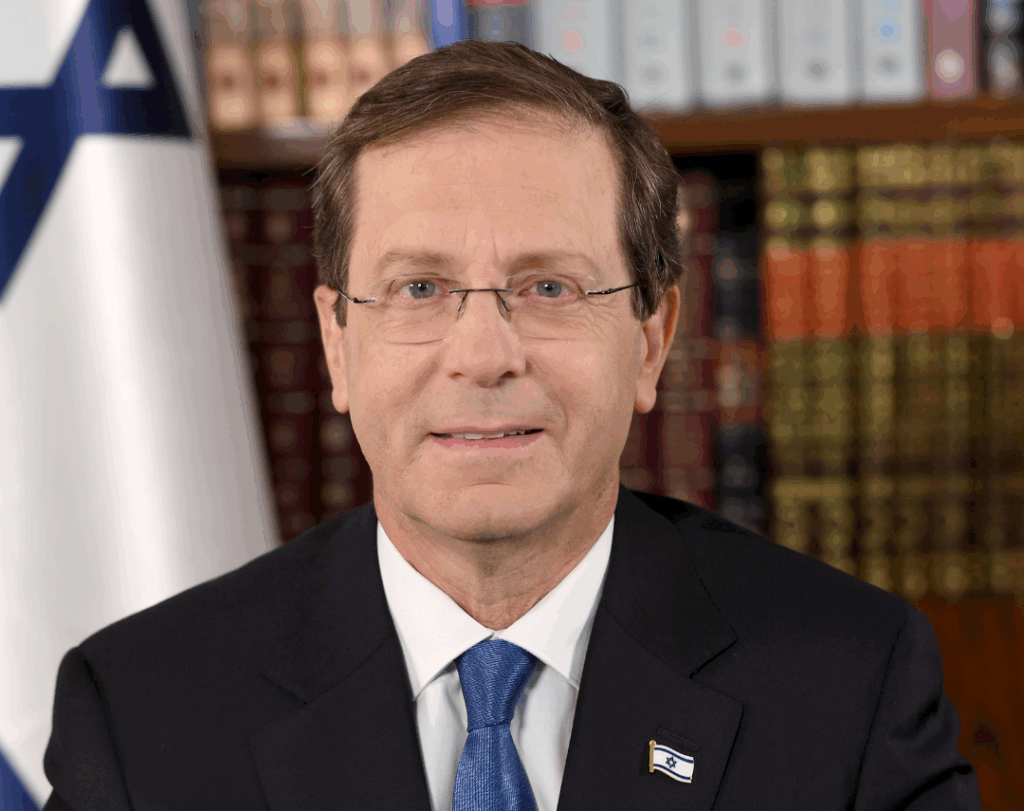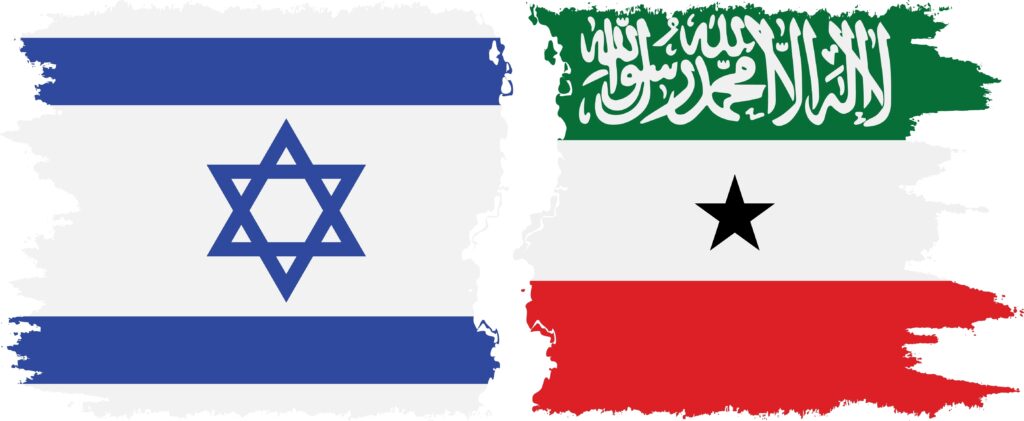UPDATES
Egypt’s Islamist Spring/More UN hypocrisy
January 31, 2013
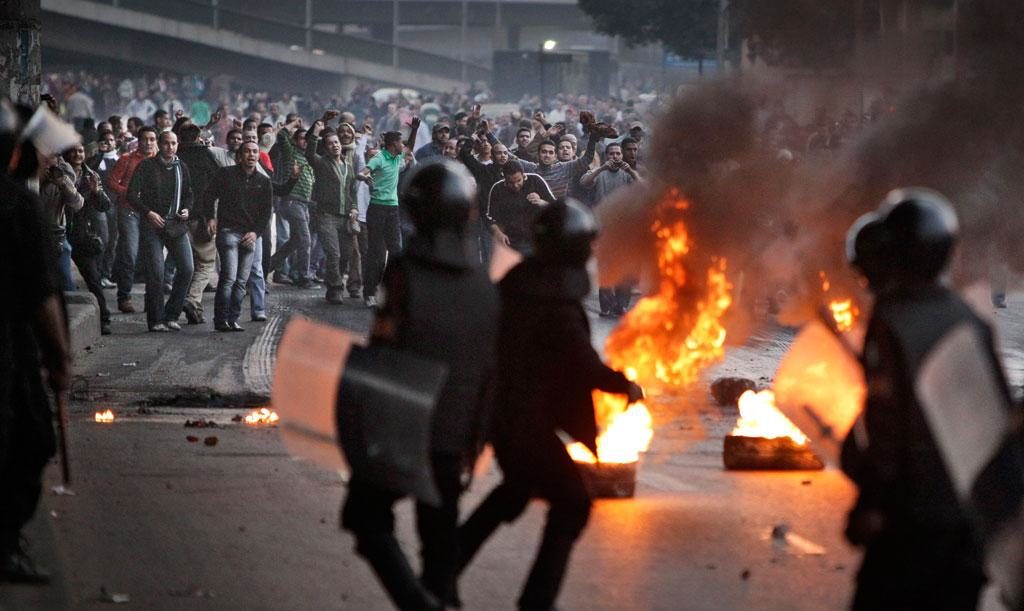
Update from AIJAC
January 31, 2013
Number 01/13 #06
Two years after the Arab Spring erupted in the Middle East, sweeping away long standing governments and leaders, the biggest winners are unquestionably the Islamists, particularly in Egypt. Today’s Update considers the strategic outlook. To the north of Israel, Syria is roiling in the blood of 60,000 dead as the Assad regime and Islamist rebels clash. To the south of Israel, Egypt’s streets are once more filling up with protesters as the Muslim Brotherhood boldly exposes its antisemitic and anti-democratic colours at breakneck speed, while its offshoot in Gaza is approaching its sixth year of rule.
First up, Reuel Marc Gerecht from the Foundation for Defence of Democracy, argues in the Wall Street Journal that the success of Islamist groups over the last two years “should end the illusion that the Jewish state can be integrated into the Middle East through territorial concessions to nondemocratic regimes”.
The rejection of Israel by her neighbours, Gerecht writes, arises from “the molten core of the Palestinian identity” which “is more Islamic than it is anything else”. Israel’s acceptance in the region is decades away and will only happen “when Arab and Iranian Muslim identities allow for it” – a process that democracy and fair and free elections can facilitate. To read Gerecht’s sobering account of the probable medium to long term course unfolding in the Middle East, CLICK HERE.
Next, in Foreign Policy magazine the Washington Institute’s Eric Trager looks at some of the myths surrounding the Muslim Brotherhood in Egypt. Trager criticises the West’s wilful blindness to the Brotherhood’s subversion of the democratic process and mostly indifferent response to its antisemitic and anti-Israel agenda. To read this article, CLICK HERE.
Finally, in the Jerusalem Post Anne Bayefsky exposes the latest anti-Israel outrage at the UN Human Rights Council which was abetted by the United States, while Syria’s human rights record is either commended or ignored, even as the thousands of dead Syrians increase at an alarming rate. To read this article, CLICK HERE.
Readers may also be interested in:
- News outlets are reporting that Israeli fighter jets targeted a Syrian convoy of Russian-made SA-17s to its Hezbollah allies in Lebanon. Read a Jerusalem Post report/analysis from Yaakov Lappin and Barry Rubin blogs on the issue too.
- Also on the subject of Hezbollah, former Spanish Prime Minister José María Aznar and former First Minister of Northern Ireland Lord David Trimble of The Friends of Israel Initiative speak out against the terror group in an essay in the Times of London.
- Ali Salim from the Gatestone Institute explores what he interprets as prophecies in the Quran that foresaw and sanctioned Jewish sovereignty over Jerusalem.
- At the Council of Foreign Relations, Elliott Abrams blogs about how far off base was the media’s groupthink in predicting a right-wing rout in the Israeli elections, and the implications of the gaffe.
- For those who missed it, onlineopinion ran AIJAC’s Daniel Meyerowitz-Katz op-ed on whether the vocal and active support for the BDS campaign by the Centre for Conflict and Peace Studies at the University of Sydney by is racist.
- Some examples from the many stories and comments now appearing at AIJAC’s daily “Fresh AIR” blog:
- Sharyn Mittelman looks at the abuse and misuse of International Holocaust Day.
- Allon Lee’s latest media column analyses some of the coverage of Israel’s elections over the last week.
Israel’s New Islamist Neighborhood
By REUEL MARC GERECHT
Wall Street Journal
January 31 2013
Israel last week held parliamentary elections, and many in America and Europe are interpreting the results as a triumph for moderates that means new hope for the Middle East peace process. But further negotiations without elections first among the Palestinians—and where acceptance of the Jewish state is on the winning ballot—will only further empower Islamic fundamentalists. The rising Islamist wave that has accompanied the Arab Spring should end the illusion that the Jewish state can be integrated into the Middle East through territorial concessions to nondemocratic regimes.
Supposed Israeli intransigence on the peace process isn’t what fueled the growth of Hamas, which today rules the Gaza Strip. The terror group grew strong, like Muslim fundamentalists elsewhere, because modernizing elites ran roughshod over society. Yasser Arafat, Mahmoud Abbas and the secular Palestine Liberation Organization’s legions of heavy-handed cronies over time empowered the religious militants of Hamas.
The formula of land-for-peace was always an illusion because it did nothing but abet the growth of those most committed to destroying Israel. It is no coincidence that Hamas gained the most ground against Fatah (the dominant group within the PLO) in the 1990s, when peace-processing was all the rage. Hamas feeds off the peace process, both its perceived successes (Palestinian autonomy throughout Gaza and most of the West Bank) and failures (East Jerusalem remaining in Israeli hands).
Israel may one day be accepted by its Arab neighbors and by its most deadly foe, Iran—but only when Arab and Iranian Muslim identities allow for it. At best, that change is decades away. Modern Islam’s great internal tug of war, between the search for authenticity and the love of modernity, must quiet before the Israeli-Palestinian clash can end.
Washington’s bipartisan establishment has never wanted to appreciate the religious dimension to the Israeli-Arab collision, for it is a subset of an older struggle between secular and religious Muslims. It was always a dubious proposition that Palestinian Arab nationalism could accept a neighboring Jewish state because the molten core of the Palestinian identity is more Islamic than it is anything else.
For any Muslim with traditional sentiments—and especially for fundamentalists—the peace process is galling because it is premised on the faithful surrendering their God-given right to a land conquered in the golden age of the rightly guided caliphs (the Muslim rulers who immediately followed Muhammad in the seventh century). For Muslims, the great Jewish prophets are Muslim prophets whom the Jews either spurned or falsified. So accepting Israel’s legitimacy, which means accepting the Jewish religious narrative in which Hebrew prophets bind their people to Israel, would be a revocation of the Quran and the foundational story of the Islamic faith.
But modernity can attenuate, as well as amplify, religious identity. Muslim fundamentalists have reared their heads so viciously in part because they know what modernity brings. They have seen their best and brightest seduced by the West. Many live in fear of democracy because it makes man, not God, the principal agent of history.
Most Israelis fear that the Arab Spring will see secular dictators replaced by religious ones. Understandably, they have little stomach for more representative government among Palestinians, which could expand Hamas’s power and bring down the monarchy in Jordan, where Palestinians may now make up more than 70% of the population.
Yet if Western history is any guide, the growth of democracy slowly diminishes religious imperatives. Representative government demystifies politics and ethics, as the here-and-now takes precedence over abstract aspirations. It makes the mundane transcendent. It promotes healthy division because it puts competing visions, even competing fundamentalist visions, to the vote. It localizes ambitions and focuses people’s passions on the national purse.
With the collapse of the peace process in 2000 amid Arafat’s bloody second intifada, Palestinians began turning a more critical eye inward. When Arafat died in 2004, Palestinians began to have, however tepidly, a debate about leadership and political mores.
Jerusalem’s decision to build a barrier between Israel and the West Bank limited the spread of suicidal fantasies among Palestinians. George W. Bush
An electorally triumphant Hamas might be able to harness democracy to a total war against the Jews. Ditto for the Egyptian Muslim Brotherhood and its counterparts in Syria and Jordan. But we certainly know that Islamists untethered to elections spread the most extreme views at no cost. Secular authoritarians in Egypt, the Palestinian Authority and Jordan have gradually lost sway to fundamentalists partly because they have signed treaties with Israel that are blessed neither by elected governments nor referendums.
Although they are running against Islamic history, Arab secular democrats have some hope. Religious authoritarianism secularizes societies pretty quickly.
In 1979, religious millenarianism was a mass movement in Iran. But the hollowing of revolutionary fervor set in motion a popular re-evaluation of the Islamic Republic’s hatred of the United States and Israel. In 2009, Iranian youths protesting for democracy pointedly mocked the Palestinian cause as not their own. The Iranian people, if their votes could rule, would surely restore diplomatic relations with Washington and possibly even with Israel.
A similar process is likely among the Arabs, where democracy will probably produce majoritarian governments ruled by authoritarian Islamists. Their attempts to enforce certain Islamic values through legislation will inevitably produce faction and fatigue. Secularists will grow stronger. And unlike their great liberal forbearers of the 19th and early-20th centuries, Muslim secularists who win at the ballot box will be much less inclined to kowtow to orthodox Islamic sentiments. Accepting Israel, though still unpleasant, will seem less a dastardly, Western-imposed act.
The age of Islamism and democracy has just arrived. The interplay may be long, arduous and ugly. But it is conceivable that Israelis, Arabs and Iranians will finally find a modus vivendi based on something more profound than land-for-peace. It will be based on free men voting.
Mr. Gerecht, a former Middle East specialist at the CIA, is a senior fellow at the Foundation for Defense of Democracies and the author of “The Wave: Man, God, and the Ballot Box in the Middle East” (Hoover Institution Press, 2011).
Back to Top
————————————————————————
How did so many Western analysts get Egypt’s Islamist movement so wrong?
BY Eric Trager
Foreign Policy, January 28, 2013
“They’re democrats.”
Don’t kid yourself. Long before the Jan. 25 revolution that ousted Egyptian President Hosni Mubarak, many academics and policymakers argued that his main adversary — the Muslim Brotherhood — had made its peace with democracy. This was based on the assumption that, since the Muslim Brotherhood participated in virtually every election under Mubarak, it was committed to the rule of the people as a matter of principle.
It was also based on what typically sympathetic Western researchers heard from Muslim Brotherhood leaders, and what I heard as well. “Democracy is shura,” Brotherhood Deputy Supreme Guide Khairat al-Shater told me during a March 2011 interview, referring to the Islamic jurisprudential tool of “consultation.” The implication was that the Brotherhood accepted a political system that encouraged open debate.
Yet since the Muslim Brotherhood’s candidate, Mohamed Morsy, was elected president in June, the exact opposite has been true. The Brotherhood’s only real “consultation” has been with the Egyptian military, which the Brotherhood persuaded to leave power by ceding substantial autonomy to it under the new constitution. Among other undemocratic provisions, this backroom deal yielded constitutional protection for the military’s separate court system, under which civilians can be prosecuted for the vague crime of “damaging the armed forces.”
Meanwhile, the Brotherhood has embraced many of the Mubarak regime’s autocratic excesses: Editors who are critical of the Brotherhood have lost their jobs, and more journalists have been prosecuted for insulting the president during Morsy’s six months in office than during Mubarak’s 30-year reign. And much as Mubarak’s ruling party once did, the Brotherhood is using its newfound access to state resources as a political tool: It reportedly received below-market food commodities from the Ministry of Supply and Social Affairs, which it is redistributing to drum up votes in the forthcoming parliamentary elections.
The Brotherhood’s most blatantly undemocratic act, however, was Morsy’s Nov. 22 “constitutional declaration,” through which he placed his presidential edicts above judicial scrutiny and asserted the far-reaching power to “take the necessary actions and measures to protect the country and the goals of the revolution.” When this power grab catalyzed mass protests, Morsy responded by ramming a new constitution through the Islamist-dominated Constituent Assembly, and the Brotherhood later mobilized its cadres to attack the anti-Morsy protesters, and subsequently extract confessions from their captured fellow citizens. So much for promises of “consultation.”
As the Brotherhood’s first year in power has demonstrated, elections do not, by themselves, yield a democracy. Democratic values of inclusion are also vital. And the Muslim Brotherhood — which has deployed violence against protesters, prosecuted its critics, and leveraged state resources for its own political gain — clearly lacks these values.
“They’re Egypt’s evangelicals.”
False. While it is certainly true that Muslim Brothers, like America’s Christian evangelicals, are religious people, the Brotherhood’s religiosity isn’t its most salient feature. Whereas Christian evangelicals (as well as devout Catholics, orthodox Jews, committed Hindus, and so on) are primarily defined by their piety, the Muslim Brotherhood is first and foremost a political organization — a power-seeking entity that uses religion as a mobilizing tool. As a result, the political diversity within the evangelical community, including its quietist trend, cannot exist within the Muslim Brotherhood, which strives for political uniformity among its hundreds of thousands of members.
The Brotherhood achieves this internal uniformity by subjecting its members to a rigorous five- to eight-year process of internal promotion, during which time a rising Muslim Brother ascends through four membership ranks before finally becoming a full-fledged “active brother.” At each level, Brothers are tested on their completion of a standardized Brotherhood curriculum, which emphasizes rote memorization of the Quran as well as the teachings of Brotherhood founder Hassan al-Banna and radical Brotherhood theorist Sayyid Qutb. Rising Muslim Brothers are also vetted for their willingness to follow the leadership’s orders, and Muslim Brothers ultimately take an oath to “listen and obey” to the organization’s edicts.
The Brotherhood’s 20-member executive Guidance Office, meanwhile, deploys its well-indoctrinated foot soldiers for maximum political effect. The movement’s pyramid-shaped hierarchy quickly disseminates directives down to thousands of five- to 20-member “families” — local Brotherhood cells spread throughout Egypt. These “families” execute the top leaders’ orders, which may include providing local social services, organizing mass demonstrations, mobilizing voters for political campaigns, or more grimly, coordinating violent assaults on anti-Brotherhood protesters.
By channeling deeply committed members through an institutionalized chain of command, the Brotherhood has discovered the key ingredients for winning elections in a country where practically everyone else is deeply divided. For this reason, it is extremely protective of its internal unity: Its current leaders have largely dodged ideological questions — such as explaining what “instituting the sharia [Islamic law]” means in practice — to prevent fissures from emerging.
The Brotherhood has further maintained internal unity by banishing anyone who disagrees with its strategy. It excommunicated a former top official, Abdel Moneim Aboul Fotouh, when he declared his presidential candidacy in mid-2011 despite the Brotherhood’s policy at the time against nominating a presidential candidate — and even after the Brotherhood reversed its own decision, Aboul Fotouh remained persona non grata. It similarly ousted top Brotherhood youths who opposed the establishment of a single Brotherhood party and called on the Brotherhood to remain politically neutral.
To be sure, the Brotherhood’s long-term vision is religious: It calls for “instituting God’s sharia and developing the Islamic nation’s renaissance on the basis of Islam.” But the Brotherhood views itself the key vehicle for achieving this vision, which is why it places such a priority on protecting its organizational strength and internal unity. Indeed, far from approximating a devout religious group akin to evangelical Christians, the Muslim Brotherhood’s disciplined pursuit of power — which includes indoctrinating members and using force against detractors — makes it most similar to Russia’s Bolsheviks.
“They’re essentially free-market capitalists.”
Not really. In the aftermath of the Muslim Brotherhood’s rapid emergence as Egypt’s new ruling party, the existence of wealthy businessmen within the organization’s top ranks was taken as a sign that it was a capitalist organization that would put Egypt’s economic interests first and thus steer a moderate course. The Brotherhood’s supposed capitalism was also taken as a sign that it would seek cooperation with the West as it pursued foreign direct investment.
But just as electoral participation doesn’t necessarily make an organization democratic, being led by wealthy businessmen doesn’t make the Brotherhood capitalist.
Not that the Muslim Brotherhood claims to be capitalist anyway. “It is not,” Ashraf Serry, a member of the Brotherhood’s economic policy-focused “Renaissance Project” team, told me during a June 2012 interview. The Brotherhood, he explained, believed in striking a balance between “the right to capture … treasure” and “the ethics and values that secure the society” — whatever that means.
The text of the “Renaissance Project” is similarly ambivalent. On one hand, the platform emphasizes capitalist ideas such as ending monopolistic practices, encouraging foreign trade, reducing Egypt’s deficit, and cutting many of the bureaucratic regulations that inhibit the emergence of new businesses. Yet it also envisions a large role for the state in managing Egypt’s economy, including price controls for commodities, “strict oversight” of markets, “reconsideration” of the Mubarak-era privatizations of state-owned enterprises, and governmental support for farmers. And of course, there’s a substantial Islamist component to the Brotherhood’s economic agenda, which calls for establishing governmental Islamic financial institutions and using zakat (religiously mandated charity) and waqf (Islamic endowments) as tools for combating poverty.
What this hodgepodge of economic ideas means in practice remains unclear, because the Brotherhood has been rather skittish about making economic decisions since assuming power. While the Brotherhood has seemingly overcome its initial objections to accepting an interest-bearing loan from the International Monetary Fund (interest is forbidden in many interpretations of Islam), it has nonetheless postponed signing off on the loan repeatedly. And while Morsy has tried to implement certain policies for cutting government spending and raising revenue — such as instituting a 10 p.m. curfew for restaurants and shops and increasing taxes on certain goods — he has immediately backtracked on each occasion under pressure from his own Brotherhood colleagues.
If anything, the Brotherhood’s economic policy is ultimately characterized by indecision — both because of its contradictory economic ideas and the political challenges it faces. As Egypt enters a fiscal tailspin, with cash reserves falling from $36 billion in February 2011 to approximately $15 billion today, that isn’t going to be good enough.
“They accept the treaty with Israel.”
They never will. U.S. President Barack Obama’s administration took comfort from Morsy’s handling of the November Gaza war: From Washington’s viewpoint, the Egyptian president resisted using the conflict as a pretext to break relations with Israel, and instead authorized negotiations with the Jewish state to achieve a relatively speedy ceasefire.
From the Muslim Brotherhood’s perspective, however, Morsy preserved the movement’s anti-Israel agenda. He stood by his refusal to meet with Israelis by outsourcing those negotiations to Egyptian intelligence officials; the ceasefire strengthened Hamas, the Palestinian branch of the Muslim Brotherhood; and the Egyptian government accepted no new responsibilities to stem the flow of weapons into Gaza. Far from yielding to the reality of Egyptian-Israeli relations, Morsy simply deferred their reassessment so that he could focus on his more immediate goal — consolidating the Muslim Brotherhood’s control at home. Indeed, one day after the Gaza ceasefire, Morsy issued his power-grabbing constitutional declaration, and rammed through a new Islamist constitution shortly thereafter.
This is, in fact, the very order of events that the Muslim Brotherhood envisions in its long-term program. As Shater explained during his April 2011 unveiling of the Brotherhood’s “Renaissance Project,” building an “Islamic government” at home must precede the establishment of a “global Islamic state,” which is the final stage in achieving “the empowerment of God’s religion.” To be sure, consolidating power at home could take years, and the fact that the Brotherhood doesn’t totally control Egypt’s foreign-policy apparatus will also prevent it from scrapping the Egyptian-Israeli peace treaty — for now.
But the Muslim Brotherhood does aim to scrap the treaty, which simply cannot be reconciled with the anti-Israel and anti-Semitic hatred in which every Muslim Brother is thoroughly indoctrinated. This vitriol was perhaps most apparent in Morsy’s now-infamous 2010 remarks, in which he called Jews “the descendants of apes and pigs.” Even as president, Morsy’s blatant bigotry remains irrepressible: In a meeting with a U.S. Senate delegation in Cairo, Morsy implied that the U.S. media was controlled by the Jews.
And while the Brotherhood’s apologists claim that these are idle words on which the movement won’t act, its leaders have repeatedly signaled the opposite. In recent months, the Brotherhood’s political party drafted legislation to unilaterally amend the treaty, a Brotherhood foreign policy official told a private salon that Morsy was working to “gradually” end normalization with Israel, and Supreme Guide Mohamed Badie has twice called for Muslims to wage a “holy jihad” to retake Jerusalem.
Washington should stop deluding itself: It will not be able to change the Brotherhood’s ideology on Israel. Instead, it should focus squarely on constraining the Brotherhood’s behavior in order to prevent it from acting on its beliefs anytime soon. As the Brotherhood makes quite clear on its Arabic media platforms, it has no intention of reconciling itself to the reality of either the peace treaty or the very existence of Israel.
“They can’t lose.”
Expect the unexpected. In the immediate aftermath of Mubarak’s ouster, many Egypt analysts took the Brotherhood at its word when it promised not to run for a majority of Egypt’s first post-revolutionary Parliament, and many predicted that the Brotherhood would only win 20 to 30 percent of the seats. The Brotherhood’s impressive succession of electoral victories and quick assumption of executive authority, however, has led to the rise of a new conventional wisdom: When it comes to the ballot box, the Muslim Brotherhood cannot lose.
Yet the lesson of the Arab Spring is that what appears to be stable at one moment can be toppled at another — especially if people are frustrated enough with the status quo. The conditions that sparked Egypt’s 2011 uprising have only worsened in the past two years: The country’s declining economy has intensified popular frustrations, and the constant labor strikes and street-closing protests indicate that the Brotherhood’s rule is far less stable than it might appear on the surface. Meanwhile, Morsy’s dictatorial maneuvers have forced an anti-Brotherhood opposition to form much more quickly than previously imagined.
Most importantly, a close look at voting data suggests non-Islamists are making critical gains among the Egyptian public. 57 percent of Egyptians voted for non-Islamist candidates during the first round of the 2012 presidential elections, and non-Islamist candidate Ahmed Shafiq won more than 48 percent in the second round — despite being very unattractive to many Egyptians for having served as Mubarak’s last prime minister. Moreover, though the Brotherhood successfully campaigned for the December constitutional referendum and won nearly 64 percent of the vote, turnout was only 33 percent — meaning that the movement was only able to mobilize, at most, about 21 percent of the voting public.
To be sure, the Brotherhood is exceedingly likely to win the forthcoming parliamentary elections, and it may rule Egypt for some time. It is, after all, uniquely well organized, while its opponents are deeply divided: To the Brotherhood’s theocratic right, the Salafists are split among a handful of competing organizations and, to its left, the field is even more fragmented among communists, socialists, Nasserists, old ruling party members, and a smattering of liberals. Perhaps most dangerously, the Brotherhood’s quick ascent has empowered it to shape Egypt’s new political institutions, and it will likely tailor these institutions to perpetuate its reign.
But the Brotherhood’s support isn’t strong enough to preclude the emergence of a challenger. For that reason, the United States must ensure that it avoids the impression that it is putting all of its eggs in the Brotherhood’s basket. Already, non-Islamists are asking why the United States has been loath to squeeze a new ruling party that is neither democratic nor, in the long run, likely to cooperate in promoting U.S. interests. Whether or not these non-Islamists can effectively challenge the Brotherhood right now — and I am dubious — they are right in challenging the Washington conventional wisdom that fails to see the Brotherhood for what it is: a deeply undemocratic movement concerned above all else with enhancing and perpetuating its own power.
Back to Top
————————————————————————
An anti-Semitic agenda at the UN
By ANNE BAYEFSKY
Jerusalem Post, January 29 2013
Israel has taken a stand against suffering through a review by a council that commends Syria and demonizes its southern neighbor.
Just days after the UN put on a show about Holocaust remembrance, it is business as usual in terms of demonizing and encouraging hatred of Jews in the present. In Geneva, the UN’s top human rights body, the Human Rights Council, is conducting its so-called “Universal Periodic Review” (UPR), and Israel was supposed to arrive before the firing squad on January 29 to listen to Iran itemize the failings of “the Zionist entity.” The greater tragedy of modern anti-Semitism, however, is that the United States and almost every other Western government pressured Israel to participate too – for the sake of the reputation of the UN and the appearance of universality. These goals were considered to be the greater good.
In the world of international human rights, the standard-bearer is the universal application of human rights principles. “We the peoples of the United Nations,” says the UN Charter, “reaffirm faith…in the equal rights…of nations large and small.” Hence, the UN Human Rights “Council,” desperate to repair the UN’s human rights credibility after Libya was elected President of the Human Rights “Commission,” created the much-trumpeted UPR. All 193 UN members undergo the same procedure – states like Syria and the United States, for example.
During the UPR, country representatives turn up in Geneva while diplomats from other states proceed to make comments and recommendations on improving the country’s human rights record. Since the country can “accept” or “reject” those recommendations, it is in its interest to line up friendly participants, a disingenuous role willingly played only by rogue states. At the end, the President of the Council thanks the country concerned, regardless of the statements made by its representatives, the recommendations it has rejected, or its actual human rights record.
So here’s how the UPR rubber hit the road of crimes against humanity in Syria. On October 7, 2011, the Syrian vice-minister of foreign affairs and his entourage took their places in the Council chamber. And then the Cubans said: “the Syrian government is working for the human rights of its people.” The North Koreans said: “we commend Syria on its efforts taken to maintain security and stability.” The Iranians said: “we appreciate the efforts of the government of Syria to promote and protect human rights.” Ditto Sudan, Nicaragua, Venezuela, Algeria, Lebanon, China, Zimbabwe, Burma/Myanmar, and so on.
Four days later, on behalf of the three countries charged with compiling recommendations, Mexico reported to the Council: “Syria received a total of 179 recommendations…It is a pleasure to inform you that 98 recommendations were accepted and 26 shall be considered.” Among the recommendations that “did not enjoy the support” of Syria were “immediately end attacks on peaceful protesters and bring violators to account,” “put an end to secret detentions” and “allow journalists to freely exercise their profession.” At the end of this stage of the UPR, the President of the Council turned to Syria and signed off with “I thank both you and your delegation for your participation in the UPR.”
At the time, there were 2,600 dead Syrian citizens at the hands of their own government. And Assad got the message about the human rights bona fides of the UN.
The next and final stage of the UPR took place in Geneva on March 15, 2012 – by which time there were 11,000 dead. On that occasion, the Council formally adopted the so-called “outcome” of the UPR – a report containing no findings and no decision to take action. It was gaveled through without comment from the President with these words: “May I now propose that the Council adopts the decision on the outcome of the Universal Periodic Review of Syria?” I see no objection.”
There are now over 60,000 dead in Syria.
And yet, incredibly, the enormous pressure now descending on Israel to play by these rules has been mounted for the sake of the credibility of the UPR. It is the Jewish state that poses the threat to the UN’s house of cards.
This is what modern anti-Semitism in the world of international affairs is really all about. Israel’s willingness to expose the lack of universal application of standards, its refusal to play with a stacked deck, its stubborn insistence that it will not go quietly into that good night, is itself an affront – a violation of the rules of a club from which Jews have been excluded throughout history.
The discrimination against Israel by the UN human rights system is not hard to find. The UN Human Rights Council has a permanent agenda of 10 items, one reserved for condemning Israel and one for considering all other 192 UN members. Almost 40 percent of all Council resolutions condemning specific countries have been directed at Israel alone. There have been more special sessions on Israel than any other country. Israel is the only UN state excluded from full membership in any of the UN’s regional groups, where key negotiations and information-sharing occurs.
The official UN document entitled “summary of stakeholder submissions,” which is intended to drive Israel’s UPR, includes allegations from NGOs that object to “the Jewish character of the state,” and demand that “five million Palestinians” should “return” to Israel to seal the deal.
And then there all the fabricated, hate-filled investigations and reports the Council regularly produces after every Israeli effort at self-defense, from the infamous “Goldstone” report – later recanted by its namesake – to the flotilla report claiming Turkish terrorists were humanitarians.
After another Council investigation on settlements was initiated last year, Israel said enough; it would not cooperate with the Council, which entailed not attending the UPR session today. Its absence at Tuesday’s UPR is the first time that anybody has cared that the hatemongering might take place in the country’s absence. The worry? Somebody might notice that the UN Human Rights Council is really not about the universal application of human rights after all.
If President Obama and his new administration were really serious about leadership, they could have easily been telling their colleagues on the Council to change the rules, because true equality cannot be built on the inequality of the few. Because the discrimination and demonization of the Jewish state and the Jewish people is not an isolatable flaw, but subverts the very foundation of human rights and the United Nations. Because the road to hell is paved with the cries of the insignificant, the marginal and the irrelevant.
But instead, through their UN Ambassador in Geneva, Eileen Donahoe, American diplomats publicly beseeched Israel last week to make nice.
With the Israeli election still sorting out decision-makers, and Western countries apoplectic about the emperor’s imminent disrobing, postponement has now occurred in the short term. In the long term, however, there is no middle ground.
Israel will no doubt continue to be bullied by the US administration, but there is an answer. Israel, too, is all for universality. So those who are similarly serious about the basics can amend two procedural, unambiguously discriminatory rules. The Human Rights Council can change its agenda so that there is one item for all 193 UN member states, and the Western regional group can fully admit Israel to its Council meetings in Geneva. Alternatively, the “Human Rights” Council can carry on, and every member stand challenged to justify its support of this agent of modern anti-Semitism.
Tags: Egypt

